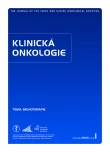Renal Toxicity of Cancer Immunother apy
Authors:
T. Büchler
Authors‘ workplace:
Onkologická klinika 1. LF UK a Thomayerovy nemocnice
Published in:
Klin Onkol 2020; 33(1): 29-31
Category:
Case Report
doi:
https://doi.org/10.14735/amko202029
Overview
Background: Acute renal impairment is a relatively rare complication of anti-tumour immunotherapy. The incidence of renal toxicity due to immuno-oncological therapy is relatively low, approximately 2% in patients treated with PD-1/PD-L1 inhibitors and 4.5% with combination treatments with PD-1/PD-L1 therapy and a CTLA-4 inhibitor. The most common underlying pathology is acute tubulointerstitial nephritis. Autoimmune nephropathy presenting as a electrolyte imbalance may also occur during immuno-oncological therapy. Discontinuation of immunotherapy and corticosteroid therapy are indicated in patients with moderate to severe renal toxicity.
Case: A 61-year-old patient with metastatic renal cell carcinoma was admitted to hospital after 7 months of treatment with nivolumab for general deterioration, severe weakness, nausea, and anorexia. Laboratory examinations showed worsening of the glomerular filtration rate, severe hyperkalaemia, and metabolic acidosis. Thyroid hormone and cortisol levels were within normal ranges. Renal tubular acidosis resulting from immuno-oncological therapy was diagnosed, and treatment with methylprednisolone was initiated. Electrolyte abnormalities and symptoms improved rapidly, after which the dose of prednisone was gradually reduced; however, after a reduction to 5 mg daily, hyperkalaemia recurred and the patient was kept on a maintenance dose of 10 mg prednisone administered orally on a daily basis thereafter. Immunotherapy was not reintroduced.
Conclusion: Renal toxicity following immuno-oncological therapy usually presents initially as an increase in the serum creatinine level without any clinical signs or symptoms. Electrolyte disturbances, oliguria, anuria, and swelling may develop gradually. Endocrine and metabolic disorders such as new-onset type 1 diabetes mellitus, hypophysitis, adrenal insufficiency, and hypothyroidism should be excluded as possible causes of electrolyte abnormalities. Corticosteroids at the usual immunosuppressive dose are the treatment of choice. The prognosis is generally favourable because renal toxicity responds well to corticosteroid treatment regardless of the underlying pathology.
Keywords:
corticosteroids – immunotherapy – Nephritis – hyperkalaemia
Sources
1. Mamlouk O, Selamet U, Machado S et al. Nephrotoxicity of immune checkpoint inhibitors beyond tubulointerstitial nephritis: single-center experience. J Immunother Cancer 2019; 7 (1): 2. doi: 10.1186/s40425-018-0478-8.
2. Perazella MA, Sprangers B. AKI in patients receiving immune checkpoint inhibitors. Clin J Am Soc Nephrol 2019; 14 (7): 1077–1079. doi: 10.2215/CJN.02340219.
3. Brahmer JR, Lacchetti C, Schneider BJ et al. Management of immune-related adverse events in patients treated with immune checkpoint inhibitor therapy: American Society of Clinical Oncology Clinical Practice Guideline. J Clin Oncol 2018; 36 (17): 1714–1768. doi: 10.1200/JCO.2017.77.6385.
4. Charmetant X, Teuma C, Lake J et al. A new expression of immune checkpoint inhibitors’ renal toxicity: when distal tubular acidosis precedes creatinine elevation. Clin Kidney J 2019; sfz051. doi: 10.1093/ckj/sfz051.
5. El Bitar S, Weerasinghe C, El-Charabaty E et al. Renal tubular acidosis an adverse effect of PD-1 inhibitor immunotherapy. Case Rep Oncol Med 2018; 2018 : 8408015. doi: 10.1155/2018/8408015.
6. Barroso-Sousa R, Ott PA, Hodi FS et al. Endocrine dysfunction induced by immune checkpoint inhibitors: practical recommendations for diagnosis and clinical management. Cancer 2018; 124 (6): 1111–1121. doi: 10.1002/cncr.31200.
7. Lakomý R, Poprach A. Nežádoucí účinky moderní imunoterapie a jejich řešení v klinické praxi. Klin Onkol 2015; 28 (Suppl 4): 4S103–4S114. doi: 10.14735/amko2015 4S103.
Labels
Paediatric clinical oncology Surgery Clinical oncologyArticle was published in
Clinical Oncology

2020 Issue 1
- Possibilities of Using Metamizole in the Treatment of Acute Primary Headaches
- Metamizole at a Glance and in Practice – Effective Non-Opioid Analgesic for All Ages
- Metamizole vs. Tramadol in Postoperative Analgesia
- Spasmolytic Effect of Metamizole
- Safety and Tolerance of Metamizole in Postoperative Analgesia in Children
-
All articles in this issue
- Side Effects and Efficacy of Immunotherapy
- Neurotoxicity and Immunotherapy
- Management of Immune-Related Endocrinopathies in Anticancer Treatment with Checkpoint Inhibitors
- Immunotherapy-Associated Myocarditis
- Gastrointestinal Toxicity of Immunotherapy
- Renal Toxicity of Cancer Immunother apy
- The Importance of Cancer-Associated Fibroblasts in the Pathogenesis of Head and Neck Cancers
- Long-Term Clinical Results of IGRT in Prostate Cancer Treatment
- Programmed Death-Ligand 1 Expression in Non-Small Cell Lung Carcinoma Biopsies and Its Association with Tumor Infi ltrat ing Lymphocytes and the Degree of Desmoplasia
- Novel Aspects of Genetics, Molecular Biology and Clinical Oncology of Sarcomas
- Editorial
- Aktuality z odborného tisku
- The Important Role of STAT3 in Chronic Lymphocytic Leukaemia Biology
- Clinical Oncology
- Journal archive
- Current issue
- About the journal
Most read in this issue
- Side Effects and Efficacy of Immunotherapy
- Neurotoxicity and Immunotherapy
- The Important Role of STAT3 in Chronic Lymphocytic Leukaemia Biology
- Immunotherapy-Associated Myocarditis
